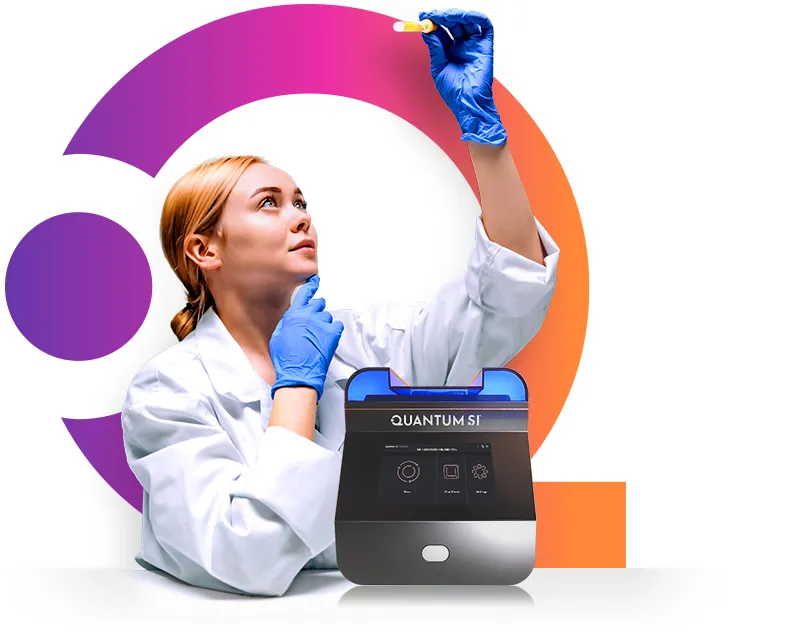
Quantum-Si and Leading Researchers to Showcase Advances in Next-Generation Protein Sequencing™ at US HUPO 2025
Quantum-Si Incorporated (Nasdaq: QSI) (“Quantum-Si,” “QSI,” or “the Company”), renowned as The Protein Sequencing Company™, is set to highlight groundbreaking advancements in Next-Generation Protein Sequencing™ (NGPS™) at the upcoming US Human Proteome Organization (US HUPO) 2025 conference. The prestigious event, taking place in Philadelphia, Pennsylvania, will feature an exclusive panel discussion and multiple scientific poster presentations, underscoring the transformative potential of NGPS™ in proteomics research and clinical applications.
Breaking Boundaries: How Next-Generation Protein Sequencing™ is Shaping the Future of Proteomics
Sponsored Panel Discussion: Breaking Boundaries in Proteomics
Quantum-Si will sponsor and moderate an insightful panel discussion titled “Breaking Boundaries: How Next-Generation Protein Sequencing™ is Shaping the Future of Proteomics.” This highly anticipated session is scheduled for February 25, 2025, from 12:30 to 1:30 PM ET.

The panel will offer an in-depth exploration of recent research leveraging Quantum-Si’s revolutionary Platinum® Pro benchtop instrument, which integrates innovative sequencing technologies to push the boundaries of protein analysis. The discussion will cover the development and application of Quantum-Si’s pioneering protein barcoding kit, designed for sample multiplexing, as well as the company’s new library preparation solution, which allows for lower sample input while maintaining high sequencing accuracy. These advances significantly broaden the scope of proteomic analysis by enhancing throughput and sensitivity.
A distinguished panel of scientific leaders will guide the discussion, including:
- Dr. Benjamin Garcia, Professor and Chair of Biochemistry and Molecular Biophysics, Washington University in St. Louis
- Dr. Stephanie Cologna, Associate Professor of Chemistry, University of Illinois Chicago
- Dr. John Prensner, Assistant Professor of Pediatrics and Biological Chemistry, University of Michigan
The conversation will focus on how NGPS™ is addressing long-standing challenges in proteomics, the impact of high-resolution protein sequencing on biomedical research, and the future integration of NGPS™ with complementary analytical technologies. This session aims to provide attendees with valuable insights into how NGPS™ is revolutionizing protein research and its broader implications for drug discovery, biomarker identification, and personalized medicine.
Scientific Posters Showcasing NGPS Innovation
In addition to the panel discussion, Quantum-Si and leading researchers will present a series of scientific posters, further demonstrating the versatility and power of Next-Generation Protein Sequencing™ technology.
Protein Sequencing with Single Amino Acid Resolution Discerns Myopathy-Linked Regions in Tropomyosin Peptidoforms
- Presenter: Madison Mehlferber, Ph.D., Postdoctoral Research Associate, University of Virginia
- Date & Poster Number: February 24, Poster 777
This presentation highlights how NGPS™ enables the differentiation of structurally similar tropomyosin isoforms and post-translational modifications (PTMs) at single-amino-acid resolution. By identifying subtle yet critical protein variations, NGPS™ plays a pivotal role in understanding myopathy-linked protein regions and their impact on muscle diseases. The study underscores the value of high-resolution protein sequencing in clinical and diagnostic applications, particularly in elucidating disease mechanisms at the molecular level.
Reducing Protein Input for Next-Generation Protein Sequencing on the Platinum Instrument
- Presenter: Madelyn Davis, Field Application Scientist, Quantum-Si
- Date & Poster Number: February 25, Poster 792
This study introduces Quantum-Si’s innovative Library Prep Kit, a novel solution designed to lower the protein input requirements while maintaining exceptional sequencing accuracy. By reducing the amount of starting material needed, this advancement significantly expands the applicability of NGPS™ to limited or rare biological and clinical samples. This breakthrough enables researchers to conduct high-precision protein sequencing even when faced with minimal sample availability, a common challenge in clinical proteomics and biomarker discovery.
Accurate Measurement of Peptide Variant Mixtures with Next-Generation Protein Sequencing
- Presenter: Deepak Mistry
- Date & Poster Number: February 25, Poster 794
This research explores the partitioning model developed to enhance the precision of peptide variant composition estimation using NGPS™. By refining how peptide variants are identified and quantified within complex biological and synthetic peptide mixtures, this model improves the analytical capabilities of NGPS™, enabling deeper insights into protein diversity and function. These findings hold significant implications for proteomic research, particularly in identifying disease-associated peptide variations that could serve as novel biomarkers or therapeutic targets.
Protein Barcoding and Next-Generation Protein Sequencing for Multiplexed Protein Selection, Analysis, and Tracking
- Presenter: Joel McDade, Ph.D.
- Date & Poster Number: February 25, Poster 796
This poster introduces protein barcoding, a cutting-edge methodology that, when combined with NGPS™, allows for multiplexed identification and characterization of proteins. This approach provides an efficient and precise mechanism for tracking protein affinity, localization, and expression across various biological contexts. By leveraging protein barcoding, researchers can gain unparalleled insights into protein-protein interactions and dynamic cellular processes, advancing the frontiers of systems biology, drug discovery, and personalized medicine.
The Impact of Next-Generation Protein Sequencing on the Future of Proteomics
The advancements showcased by Quantum-Si and its research partners at US HUPO 2025 illustrate how Next-Generation Protein Sequencing™ is redefining proteomics. Traditional protein analysis techniques, such as mass spectrometry, have long served as the gold standard in proteomic research. However, these methods often face limitations, including incomplete sequence coverage, high sample input requirements, and difficulty detecting low-abundance proteins. NGPS™ directly addresses these challenges by offering single-molecule resolution, higher sensitivity, and the ability to analyze complex peptide mixtures with unprecedented precision.
The implications of these innovations extend across multiple scientific and medical domains:
- Biomedical Research & Disease Mechanisms: NGPS™ facilitates a more detailed understanding of protein modifications, mutations, and interactions critical to disease progression.
- Drug Development & Biomarker Discovery: Enhanced sequencing accuracy enables the identification of novel drug targets and disease-specific protein biomarkers, driving more effective therapeutic strategies.
- Personalized Medicine: The ability to sequence proteins at a granular level supports the development of customized treatment plans, tailored to individual patients based on their unique protein profiles.
- Synthetic Biology & Bioengineering: The precision of NGPS™ accelerates advances in protein design, synthetic enzyme development, and engineered biomaterials.
Quantum-Si’s presence at US HUPO 2025 reinforces its commitment to pioneering next-generation protein sequencing technologies and fostering collaborations that push the boundaries of proteomic research. By making high-resolution, accessible protein sequencing a reality, Quantum-Si is empowering scientists and clinicians worldwide to unlock new insights into the molecular underpinnings of health and disease.
As the field of proteomics continues to evolve, Next-Generation Protein Sequencing™ is poised to play a central role in shaping the future of biomedical discovery. The insights presented at US HUPO 2025 serve as a testament to the transformative potential of NGPS™ and its growing impact on the global scientific community.





